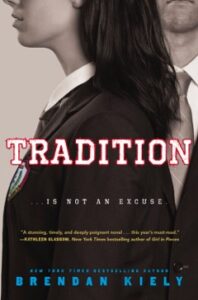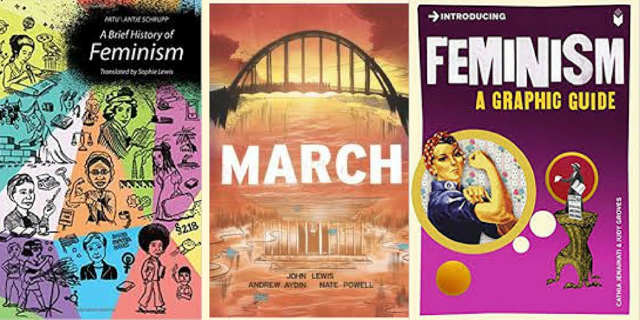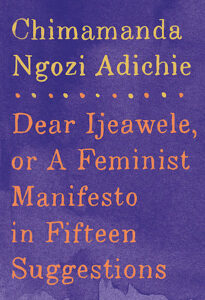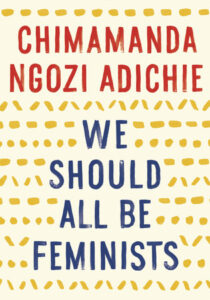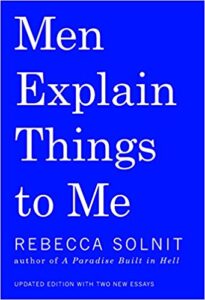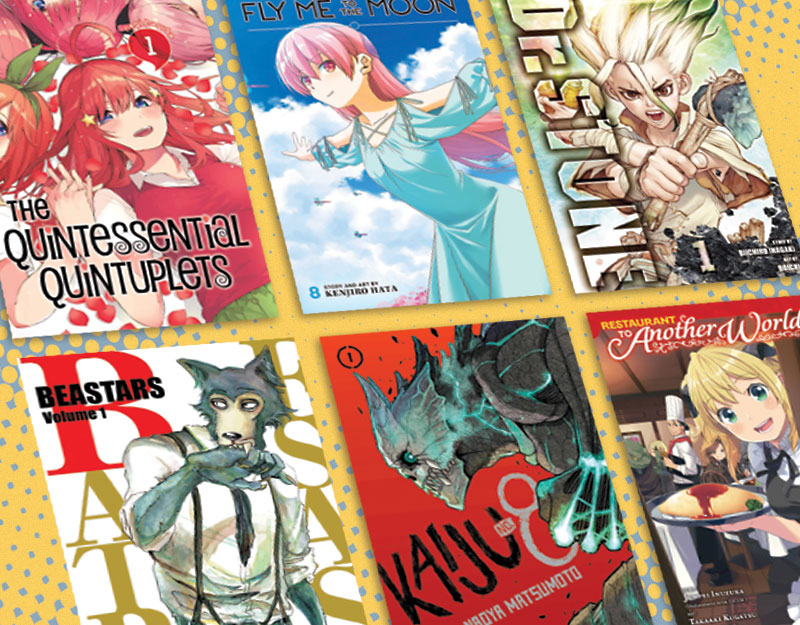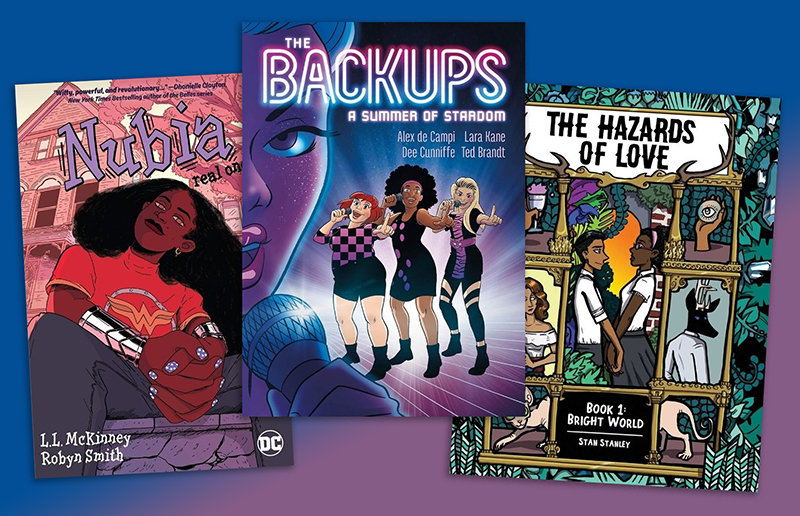#ReadForChange: Back to School with Brendan Kiely’s TRADITION
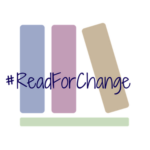 Teen Librarian Toolbox is excited to be partnering with Marie Marquardt for her #ReadForChange project. Hop on over to this post to learn more about the initiative. Today, she and Brendan Kiely join us for a conversation about power, feminism, toxic masculinity, taking action, and Brendan’s powerful 2018 book, Tradition. Please see the end of this post to enter to win a signed copy of this book!
Teen Librarian Toolbox is excited to be partnering with Marie Marquardt for her #ReadForChange project. Hop on over to this post to learn more about the initiative. Today, she and Brendan Kiely join us for a conversation about power, feminism, toxic masculinity, taking action, and Brendan’s powerful 2018 book, Tradition. Please see the end of this post to enter to win a signed copy of this book!
There’s really no such thing as the “voiceless.” There are only the deliberately silenced, or the preferably unheard.
– Arundhati Roy
“How Can Men be Better Feminists?”
Okay, folks. I’m about to climb up on my soapbox for a little bit, so get ready. (Or ignore this post until you’re prepared for a rant. These are tough times. Please be gentle with yourself!)
ADVERTISEMENT
ADVERTISEMENT
If you’ve been paying any attention at all to what’s happening in the world around you, then the claim I’m about to make will not come as a surprise. Many of the terrible ills that plague our society — and, here in the United States, also threaten our democracy — can be traced to a certain sort of privileged man. You know the type – they carry their entitlement as if it were somehow built into their DNA. They simply assume themselves to be untouchable – above the norms and laws and ethics that hold our communities together. And, if we’re being really honest, they pretty-much are able to live above or outside of those shared norms. Why? Because they live deep inside institutions that both grant them this power and protect them from losing it. They abuse their power. They abuse people because they perceive those people as objects, and not as their fully-human equals.
But then there are the men we may expect to be “the type” until we find out how very, profoundly wrong we are. They may be the jocks, the prep-school kids. They may be the recovering addicts. They may be the men who have made terrible mistakes, but who humbly seek guidance, looking to other people as models for how to live well. These men seek to understand the difference between right and wrong, and then they try to do what’s right. Sure, they mess up sometimes. But they try, and that means something.
They share a few things in common: they listen, they embed themselves in communities of trust. And by listening carefully in these communities, they learn – maybe slow and faltering – how to fight alongside their fully-human equals for what is right and good.
Brendan Kiely has astonishing talent. He writes stories that reveal to us both of these characters, while also unmasking the institutions that shape their lives (think: churches, police forces, and prep schools). His first novel, The Gospel of Winter is the gut-wrenching story of Aidan, a terribly broken boy, who struggles to decide whether he should reveal the abuse inflicted by his priest. I won’t claim that it’s an easy read (it’s particularly excruciating for Catholics like myself), but it’s powerful and compelling and – in the end – hopeful. In All American Boys (co-authored with Jason Reynolds), he introduces Quinn, who has to re-think everything he thought he knew about right-and-wrong, good-and-bad, when his mentor and big-brother figure, a police officer, assaults a black teenager from his high school.
Tradition, Brendan’s most recent novel, unflinchingly reveals life inside of a prep-school infused with toxic masculinity. More importantly, though, the story celebrates those courageous people who dare to make visible the toxic abuse of power, and of people. Tradition is, like most excellent novels, a multilayered story. But it is, at least in part, the story of how a boy named Bax, burdened by the mistakes of his past, learned to trust that he knew right from wrong and then developed the courage to do what was right.
“Before I act, I need to listen.”: Real Talk with Brendan Kiely
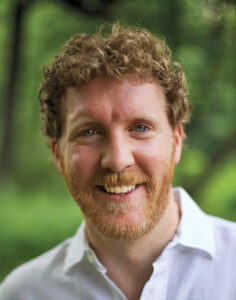 MARIE: Tell us about the moment when you knew that this story had to be written, and that you needed to address these tough themes head-on.
MARIE: Tell us about the moment when you knew that this story had to be written, and that you needed to address these tough themes head-on.
BRENDAN: I’m hesitant to locate a moment, partially because I’m kind of dense and rarely respond to (or recognize when it hits me!) a bolt of inspiration, but also because I’m associative and nonlinear. Parts of my past resonate with parts of my present and when the emotions seem correlative, I know there’s a story in there. Also, as I’m looking around at the world, I formulate questions I want to try to address through fiction.
By way of example, I’ve shared this story before, and I think it does get at the crux of why I wanted to write Tradition.
Shortly before my senior prom, my high school allowed a tuxedo rental company to hang advertisements in the halls of our academic building. In the poster, four guys in tuxedos huddled around one girl in a prom dress, but the girl was tipped headfirst toward the floor, her legs in the air, spread open. In my all-boys’ high school, the poster reinforced the old trope of prom = sex, but it also signaled a deeper, more dangerous message as well: wear our tux and get what you want, because you are entitled to it.
The reality of that second message became clear to me when, a few weeks before going to college, I got a call from a friend, a girl who had been at that same prom. She’d been raped at the beach that summer. She didn’t want to share the details; she just wanted me to know. I listened. I believed her. Because I thought about that poster. I thought about the graffiti in my high school locker room and bathroom stalls. I thought about the way so many guys joked about sex aggressively, competitively. None of it was innocent. All of it reeked of entitlement.
An environment in which the boys think and are told they are entitled to sex, and all the messaging is about sex as a goal, and none of it is about consent and agency and seeing the human being, is an environment that nurtures, that is, rape culture. And a definition of masculinity that emerges from a culture which silences, shames, and gaslights women is dangerous—it harms women and robs men of the potential to be better human beings.
This all came back to me when in 2015 I saw the video of Emma Sulkowitz dragging her mattress across the graduation stage at Columbia University in an act of bravery and tenacity to remind the world she would not be silenced, that the story of her assault would not go unheard. The boarding school culture Jules and Bax grapple with in Tradition mirrors our broader society—all too many institutions are riddled with insidious and deeply entrenched misogyny—and I wanted to write about people who challenge that status quo. I wanted to write about the strength of women who stand up and speak out about misogyny, and also, especially as a man writing this book, I wanted to write a novel that asked: How can men be better feminists? What are men’s roles in this time of necessary cultural reckoning?
MARIE: What actions are you taking in this time of cultural reckoning? How are your actions, and the way you choose to act, shaped by your own identity?
BRENDAN: I love this question because it asks us writers to address the notion of accountability in our lives. Regardless of our intentions in telling the story, how do we live our lives?
As someone with a vast amount of social power and privilege, I’m white, male, cis-gendered, heterosexual, and not disabled, action is the language I’m accustomed to. That’s part of the privilege—I feel emboldened to act, I feel free to act. So though action is necessary, for those of us with these kinds of privileges, I think we should practice humility first and always. Choose to listen to the people in our lives, choose to listen so that we can better understand, but also so we can strengthen our empathetic hearts, instead of just telling myself, “here’s what I think I can (or should) do.” If I want to help create a more just and equitable world, before I act, I need to listen.
When my grandmother, a Catholic, and the matriarch of my predominantly Catholic family, read my first book, The Gospel of Winter, a novel about a 16-year-old boy struggling to decide whether or not he should tell people he’s been abused by his priest, I was nervous to hear what she thought. But she said, “Brendan, your book reminds me of Solomon asking God for a listening heart.” Her wisdom was profound and shook me to the core. In my life, my writing, my relationships, and all work I ever hope to do, I try to remind myself of her words, and strive to find, nurture, and practice, a “listening heart” before I act.
So rather than list the things I do (most of which are in organizations working toward more racial justice in various institutions), I’d rather emphasize the work I think we all need to do before we act: listening and believing the stories we hear—and for those of us who are men or white like me, particularly listen to and believe the stories of women and people of color, who have all too often been silenced or unheard.
MARIE: I love this wisdom! For readers who have been doing the careful work of developing this empathetic and listening heart, and who think they may be prepared for action, what’s your advice?
BRENDAN: I think it is important to remember that if we want to challenge established authority and status quo, there are inherent risks. It is dangerous to think we can affect change overnight, and it is dangerous to forget just how much work so many people have done before us in the work we hope to do today. Before joining or starting a movement, I think everyone should look through a few key texts to understanding to work, the cost, and the history. For example, one might check out these three graphic guides: A Brief History of Feminism by Patu, Antje Schrupp, and Sophie Lewis; March Trilogy by John Lewis, Andrew Aydin, and Nate Powell; and Introducing Feminism: A Graphic Guide by Cathia Jenainati and Judy Groves.
ADVERTISEMENT
ADVERTISEMENT
And, after reflecting on the work that people have done before us, if you do choose to act, always act in a group, not alone. The most successful action is collective, not individual. By partnering and growing your numbers in your own organization, you can be a lot more effective in your community.
In my perfect world, there’d be a Feminist Club in every high school in America. So, if there isn’t already a Feminist Club at the school, I’d recommend students starting one from which to grow and connect to other organizations. And if there already is a Feminist Club, maybe consider researching the kind of actions other organizations (such as the ones below) have done or are already doing and either mirror those plans or find ways to partner with those organizations in your own school.
Ready to learn more and “strengthen our empathetic hearts”? Here are Brendan’s recommended reads
To get us started, Brendan recommend an excellent list of recent articles that “lay out the realities of sexual harassment and assault and rape culture”:
“#MeToo is a wakeup call: We need to talk to youth about sexual health and ethics” (Salon)
“The reckoning: Women and power in the workplace” (New York Times)
“Your reckoning. And mine.” (The Cut)
“What does a lifetime of leers do to us?” (New York Times)
“#MeToo creator answers 10 questions and perfectly explains what the movement is all about” (UpWorthy)
Brendan also points us all toward a couple of powerful feminist books:
Dear Ijeawele, or A Feminist Manifesto in Fifteen Suggestions by Chimamanda Ngozi Adichi
We Should All Be Feminists by Chimamanda Ngozi Adichie
Men Explain Things to Me by Rebecca Solnit
And, when you’re ready to take a break from the books, he’s got several fabulous suggestions for documentaries and videos:
The Mask You Live In – a Representation Project documentary about the construction of masculinity
Nanette – a stand-up comedy act by Hannah Gadsby
Why I’m done trying to be “man enough” – a TED talk by Justin Badoni
“Regardless of our intention in telling the story, how do we live our lives?” Ready to take action? Here are a few organizations doing great work:
Creating Consent Culture – An international movement that educates and enlightens the masses on sexual assault and holistic healing to end sexual violence once and for all.
Ultraviolet – A community of people mobilized to fight sexism and create a more inclusive world.
NOW Campus Action Network – Young feminists bringing activism to their schools and colleges.
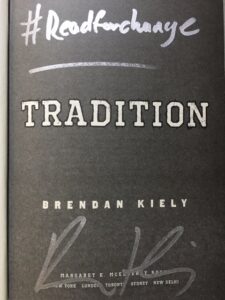 Head Back to School with #ReadForChange
Head Back to School with #ReadForChange
If you’re hoping to head back to school with a free signed copy of Tradition, here’s a link to the giveaway. We’ll be announcing the winner on Twitter @MarieFMarquardt and Instagram marie_marquardt September 1!
Meet Marie Marquardt

Marie Marquardt is the author of three YA novels: The Radius of Us, Dream Things True, and Flight Season. A Scholar-in-Residence at Emory University’s Candler School of Theology, Marie also has published several articles and co-authored two non-fiction books about Latin American immigration to the U.S. South. She is chair of El Refugio, a non-profit that serves detained immigrants and their families. She lives with her spouse, four kids, a dog and a bearded dragon in the book-lover’s mecca of Decatur, Georgia.
Filed under: Guest Post
About Amanda MacGregor
Amanda MacGregor works in an elementary library, loves dogs, and can be found on Twitter @CiteSomething.
ADVERTISEMENT
ADVERTISEMENT
SLJ Blog Network
Name That LEGO Book Cover! (#53)
Cover Reveal and Q&A: The One and Only Googoosh with Azadeh Westergaard
Exclusive: Vol. 2 of The Weirn Books Is Coming in October | News
Fighting Public School Book Bans with the Civil Rights Act
ADVERTISEMENT


